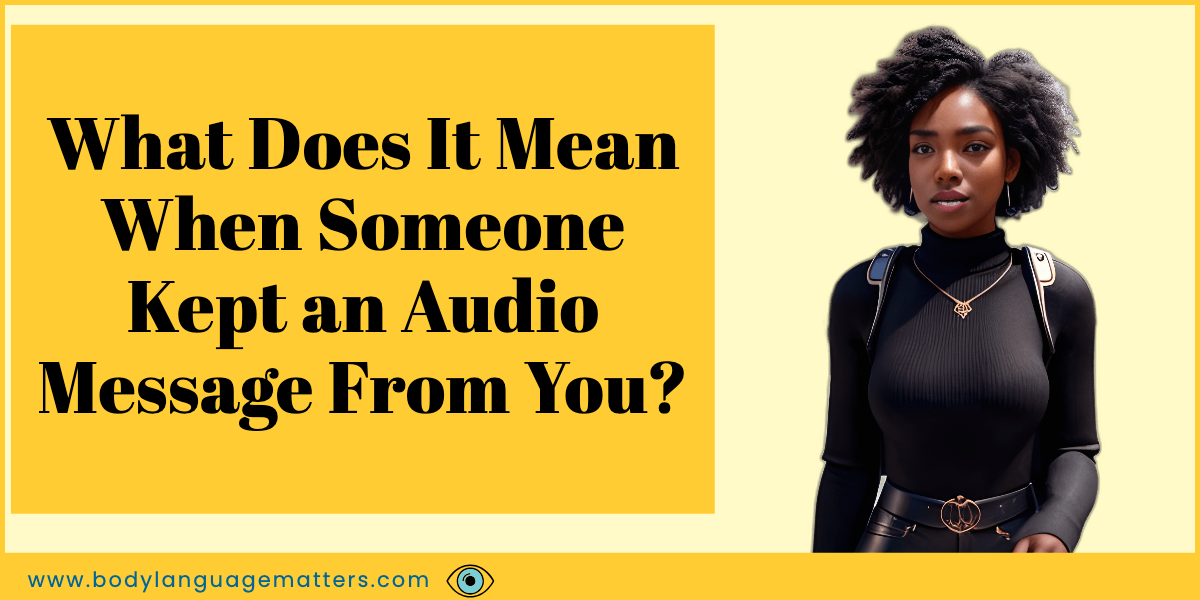Have you ever sent an audio message via iMessage and later noticed that the recipient “kept” it? It can be both perplexing and flattering. Let’s dive into what this means and how audio messages function within Apple’s iMessage system.
When Someone Keeps Your Audio Message
When someone holds onto your audio message, it can mean a few different things, depending on the situation. For instance, if you sent a passionate message to a friend discussing another friend and they chose to keep it, it’s important to consider why they might do this.
Messages can be easily forwarded or even shared on platforms like TikTok and other social media. Usually, people save audio messages if they want to use them as proof of something, or if they simply enjoy hearing your voice.
five possible reasons why someone might keep a voice-recorded message from you
Dos
- Sentimental Value: They may keep the message because it holds sentimental value to them. Your voice might bring them comfort, or the message might be a reminder of a special moment or event in your life.
- Evidence or Reference: They may need the message as evidence or reference for a future conversation or situation. This could be in a personal or professional context, such as resolving a disagreement or confirming details discussed.
- Reminders: Your message might contain important information that they need to remember, like an appointment, a list of things to do, or instructions on how to accomplish a task.
- Appreciation for Your Words: They might have found your words encouraging, insightful, or funny and might want to listen to the message again to relive that moment or share it with others.
- Lack of Time: It’s also possible that they haven’t had the time to properly listen to your message, and they’re keeping it to listen to later when they can give it their full attention.
Different people may have different reasons, and it often depends on the content of the message and the relationship between the sender and the receiver.
How To Ask Someone Not To Foward The Message On
Five psychological strategies you can use to discourage someone from forwarding your audio message
- Reciprocity: Remind the recipient of times you’ve respected their privacy or done them a favor in the past. This can create a sense of obligation to reciprocate by respecting your request not to forward the message.
- Appeal to Empathy: Share how you would feel if the message were forwarded. Encouraging the recipient to put themselves in your shoes may make them more inclined to respect your wishes.
- Convey Trust: Express your trust in the recipient’s discretion. By telling them you trust them not to forward the message, you can activate their desire to live up to that trust.
- In-group Bias: Frame your relationship with the recipient as being part of an “in-group” (e.g., “We’re close friends” or “We’re in this together”). People are more likely to protect the interests of those they consider part of their group.
- Highlight Consequences: Let the recipient know about the potential consequences of forwarding the message, whether it’s damage to your reputation, strained relationships, or other negative outcomes. People are more likely to think twice if they understand the impact of their actions.
Remember that while these psychological strategies can be effective, they’re not guaranteed to work on everyone. Being transparent and open with your request is usually the best approach.
The “Kept” Indicator Explained
After listening to an audio message, the recipient has an option to ‘keep’ it. If they do, both you and the recipient will see a ‘kept’ indicator under the message. It’s an assurance that even after years, that message will remain in their iMessage conversation history.
Why Would Someone Choose to “Keep” Your Audio Message?
Multiple reasons! Maybe the message was heartfelt, or perhaps it had important information. Or, sometimes, people let audio messages stay simply because they like the sound of your voice. Whatever the case, it’s a positive sign!
How the Default Settings Impact This Feature
Though audio messages disappear by default after 2 minutes, either the recipient specifically chooses to keep it, or their settings are adjusted to save messages indefinitely.
You may also like ?
Comparing Other Platforms: WhatsApp and Beyond
iMessage isn’t the only platform offering audio messaging. Platforms like WhatsApp have similar features, but with variances in expiration settings and indicators.
Audio Message Features on Other Platforms
On WhatsApp, for example, audio messages don’t come with an expiration timer. Thus, no “kept” indicators. This unique aspect of iMessage differentiates it from other platforms, making audio interactions more fleeting yet intimate.
Expire Settings and How to Change Them
Tired of losing your cherished voice messages after a short time? Here’s a quick fix.
How Long Do Messages Last by Default?
By default, audio messages are set to ‘after 2 minutes’. This means they’ll expire from your end, but not from the recipient’s, unless they’ve also set messages to expire after 2 minutes.
How to Make Your Messages Last Longer (Or Not)
Go to settings, find the iMessage option, and adjust your audio message settings. Choose either to let them expire after 2 minutes or set to never expire.
Why Audio Messages are Special
In our digital era, voice messages bring warmth and personalization. They’re like a simple hug in the vast world of digital messages. They connect, resonate, and sometimes, even make us laugh or cry.
What is an Audio Message on iMessage?
An audio message on iMessage is a short voice note or recording you send to someone, akin to a text message, but in audio form. It offers a personal touch, allowing you to convey emotions, tones, and nuances that text might miss.
Understanding Audio Messages on iMessage
Sending a voice note or voice message on iMessage is quite straightforward. However, understanding its intricacies can be a bit more complex.
Difference between a Voice Note and a Voice Message
While some might use the terms interchangeably, there is a subtle difference. A voice note typically refers to a pre-recorded message saved for later use, while a voice message is often a spontaneous recording sent in real-time during a conversation.
How Do Audio Messages Work on iMessage?
By default, audio messages you send or receive through iMessage may disappear or expire after 2 minutes. But why so brief? It’s primarily to save space. But, there’s a catch. The recipient can choose to keep it.
Frequently Asked Questions
How do I know if someone kept my audio message?
You’ll see a ‘kept’ indicator beneath the voice message, signaling that the recipient has chosen to retain it.
Do all audio messages expire by default on iMessage?
Yes, by default, they’re set to expire after 2 minutes. However, this can be changed in the settings.
Can I retrieve an expired audio message?
No, once an audio message expires, it’s gone from the sender’s side. However, if the recipient kept it, you can ask them to share it back.
Why don’t other platforms like WhatsApp have a ‘kept’ indicator?
Different platforms have varied features. On WhatsApp, audio messages don’t expire by default, so there’s no need for a “kept” indicator.
Is there a way to send longer audio messages on iMessage?
Yes, you can record a voice memo and then share it as a file, bypassing the usual limitations.
Final Thoughts
Understanding the nuances of audio messages on iMessage can be quite an experience. Whether it’s the thrill of seeing your message being “kept” or the sheer convenience of voice messaging, it’s a feature that’s changed how we communicate. As we continue to engage in the digital world, features like these remind us of the human touch that makes all the difference.

